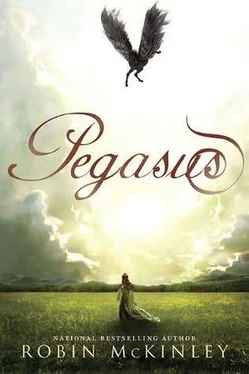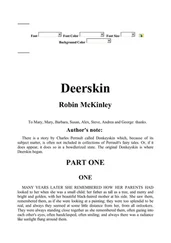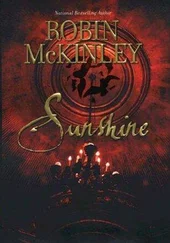Sylvi involuntarily shook her head, in human negation and disbelief. Oh , she said, srrrwa, fwif, forgive me, it is only that I have never seen you and I—I have thought I am—am aware of the pegasi who visit us.
You offer no discourtesy, Hibeehea replied. Another of my talents is that of being overlooked when I choose.
With great self-restraint Sylvi managed not to shake her head again, but a faint smile briefly appeared on Hibeehea’s face, and faded at once. I often travel alone, he continued, and I rarely remain at the palace—and I will myself to be disregarded. Mostly I wander through your towns and your countryside, listening to humans talk. It is easier for me outside the Wall.
There are fewer magicians outside the Wall, said Sylvi. The guilds’ offices are by the southeast gate; the Hall of Magicians is at the centre of the palace.
Yes , said Hibeehea.
The Hall of Magicians is at the very centre of the palace, Sylvi thought slowly, and ordinary humans aren’t allowed in it unless there’s some great ritual thing going on.
Every shaman as a part of training and acceptance must go once to your palace, Hibeehea continued. We are still hoping that one day there will be a shaman who can speak to you in your own country.
Then . . . that is why humans don’t come here. It’s the other way around too, somehow. To herself again she thought, I wonder if any magician has ever tried to cross the border? If they are rock while the shamans are water . . . I guess they cannot.
We believe so. It is nothing there is any record of. It is certainly why I was extremely reluctant to agree to your visit. For both your sake and ours. We did not know if you as king’s daughter might bring some unknown, protective human magic with you that would disrupt ours; and we were—I was—very afraid of having to send you home early, weak and ill and confused, and the reaction such an outcome would provoke among your people. I am not unaware of the difficulty your father had in persuading his council and his senate to permit you to go.
Boldly Sylvi said, Then why did you agree?
He didn’t answer for a moment, and she was afraid he would not—and that she had gone too far. He said, I drank water from the Dreaming Sea, and Redfora told me to let you come.
She could not meet his eyes. The pegasi had brought the long table out and fitted the three sections together and set the tall chair at its head. By the time Sylvi had thought of something more to say to Hibeehea, when she turned back to him, he had gone.
At the banquet she found that she stood and wandered, the way the pegasi did. It had been like this at the first banquet, but then it had seemed odd, slightly embarrassing—perhaps slightly rude, as if, as a human, she was behaving inappropriately. This second time it merely was the thing to do: Why would anyone want to sit down for an entire banquet? She wished she could introduce wandering to her father’s state dinners.... At first she thought she was avoiding sitting down because she did not want to sit in her father’s chair; or perhaps that she did not want to be marked out among the pegasi any more than she inevitably was. But she realised she was standing and wandering because she wanted to—because she was more comfortable that way. And her banquet dress, far less crushed by its three weeks rolled up in the bottom of a pannier than she had expected—perhaps some fragment of pegasus fabric magic had worked its way into her clothing bag—made a nice swishing noise as she walked. She remembered that, three weeks ago, the swish and swirl had given her courage.
The pegasi, represented by Feeaha and Driibaa, had given her a siraga, embroidered with ribbons and feathers and small sparkly stones, and specially cut to lie smoothly over human shoulders.
She also realised with an odd little twinge that her strong human hands were useful for a wandering banquet: she could easily carry with her what she was eating or drinking, which the pegasi could not. She had been to many court gatherings where all the humans had goblets or bowls or plates in their hands, and she had thought nothing of it; she thought of it now.
And there were no speeches. Ebon had taught her to say “it’s wonderful,” ifffawafi, which was another kind of all-purpose pegasus thank you, when more formal, precise gradations of thanks were not necessary. The idea is that you’re both what’s wonderful, that it’s wonderful because it’s something between the two of you. We don’t throw it all on the other person the way you humans do.
Sylvi laughed. But if you give me a really nice present, it’s you, it’s not me. I’m just standing there with—with an armful of flowers or a necklace or something, saying thank you.
Ebon said, Don’t be daft. Don’t you think what you’ve done with my present—with coming here—is at least as important as my having brought you—so that it couldhappen? With a lot of help from Dad. Our dads.
Sylvi said, Hibeehea said that Redfora told him to let me come.
Ebon looked at her. Did she really? There was a long pause. Did she really. I wish we knew what had happened to them....
Yes, she said. So do I. They looked at each other, and both knew what they were thinking: Fthoom would not have discovered any story about Redfora and Oraan.
So Sylvi wound and spiralled her upright, two-legged way among the pegasi, saying ifffawafi . They said ifffawafi back to her, but some of them smiled, and she knew that she was saying it too much; but she couldn’t help herself.
You don’t have to wear it out, said Ebon.
But it’s been wonderful, she said. Scary, she thought. Scary and wonderful. It’s been . . . I don’t know what it’s been. It’s only been eighteen days since my father left. Twenty since we left the palace. It feels like years. She added recklessly, I feel ten years older—twenty.
Well, stop it, said Ebon. I don’t, and I don’t want you older than me. He thought about it. Maybe five years. He rested his nose on her shoulder in a gesture that had become habitual in the last eighteen days. She remembered again with astonishment that she was not supposed to touch any pegasus; she had just had her arm around the queen before Ebon reclaimed her. But it was my idea before the grown-ups stole it and made a big grown-up thing about it. I’m so glad you came. Glad—hiyahaimhia—glad isn’t really good enough. I’m “hiyahaimhia, hya hyama,” I’m glad you came. That you saw the Caves.
Me too, said Sylvi, and raised her hand to put it against his cheek. Me too. I don’t care about the grown-ups.
She was crying again when she had to say good-bye to everyone but the pegasi who would be carrying her back to the human world. She cried over Niahi, she cried over Aliaalia, she cried over Feeaha and Driibaa—she even cried over Hibeehea. Hibeehea’s nose was showing one or two wrinkles as he said, You’re bound to us now, child. You’re bound to the pegasi, not just to Ebon. You have changed the world, you know, little human child. And you’ll be back, if you’re crying for the Caves too.
He sounded so like his shaman self— You have changed the world, little human child —that she stopped crying. But he was still smiling, so she said tentatively, Well, I’m mostly crying for—for the pegasi. For all my—friends.
Ah, then that is easy, he said. For we will come to visit you—yes, I too. I wish to discover how much of the world you have changed. I wish to discover if perhaps . . . Child, listen to me a moment, and he had stopped smiling. Lrrianay may say something like this too, but he is king, and bound to your father, and he sees these things from closer in—almost like a human sometimes. He looked almost grim, she thought, low-headed, his feet braced. We will come to visit your palace now not only for the sake of the Alliance, but because of you. Because you were here, and because you spoke to us. This is a great thing—but it is also a greatly dangerous thing. It is possible that to have sent you home early, weak and confused, would have been more welcome than what has happened. If I may give you my advice, king’s daughter, the advice of an old pegasus shaman, you will tell no one but your father the entire truth about your experience here. And, and he moved his head till his eyes were looking directly and levelly into hers, you may find you cannot tell even him everything.
Читать дальше












